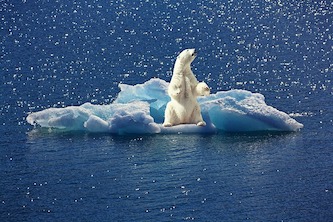Climate change is a pressing issue that is causing the world to warm at a faster rate than expected. In 2023, climate records have been broken, with historically high sea temperatures, low Antarctic sea-ice levels, and extreme weather events occurring on every continent. It is now almost certain that 2023 will be the hottest year on record, which was not predicted by major climate science organizations at the beginning of the year. The main cause of global warming is the release of greenhouse gases, such as carbon dioxide, into the atmosphere through human activities like burning fossil fuels.
There are several factors that could explain the unexpected surge in temperatures in 2023. One factor is the unusually rapid onset of a natural weather system called El Niño. El Niño releases additional heat into the atmosphere, leading to a rise in global air temperatures. Another factor is the reduction of certain air pollutants, known as aerosols, which reflect some of the Sun’s energy back into space and cool the Earth’s surface. Regulations implemented in 2020 to reduce emissions of sulphur dioxide, a harmful air pollutant, have inadvertently raised temperatures, particularly in shipping hotspots like the North Atlantic.
A large volcanic eruption in January 2022 also contributed to warming. The eruption released water vapor into the stratosphere, which is a greenhouse gas that adds to warming. While the eruption’s impact on global temperatures is still being studied, early findings suggest a limited effect. Additionally, changes in Antarctic sea-ice levels may be accelerating warming. Less reflective ice means more of the Sun’s energy is absorbed by the darker ocean surface, leading to increased warming.
Although the rate of warming has accelerated in recent decades, it has not yet exceeded the range of temperatures predicted by climate models. This provides some reassurance that the world has not entered a phase of runaway climate change. However, leading climate scientists warn that the climate may change more quickly than expected in the future. They argue that the climate has not fully responded to the greenhouse gases already emitted, and the cooling effect of aerosols may be masking the true extent of warming. The devastating climate impacts currently being experienced emphasize the urgent need to take action to phase out fossil fuels and address climate change.
Original news source: Climate change: Is the world warming faster than expected? (BBC)
Listen
Slow
Normal
Fast
Group or Classroom Activities
Warm-up Activities:
– News Summary
Instructions: Divide the class into pairs or small groups. Give each group a few minutes to read the article together. Then, ask each group to summarize the main points of the article in a news summary format. They should include the key information, such as the unexpected surge in temperatures in 2023, the factors contributing to it, and the urgent need to address climate change. Afterward, have each group share their summaries with the class.
– Opinion Poll
Instructions: Divide the class into pairs or small groups. Assign each group a specific aspect of climate change mentioned in the article, such as El Niño, volcanic eruptions, or the reduction of air pollutants. Ask each group to discuss their opinions on whether these factors are the main causes of the unexpected surge in temperatures in 2023. Have them come up with reasons to support their opinions. Afterward, conduct an opinion poll by asking each group to share their opinions and reasons with the rest of the class. Encourage respectful discussion and debate.
– Vocabulary Pictionary
Instructions: Write down a list of vocabulary words from the article on separate pieces of paper or index cards. Distribute the cards to the students, ensuring that each student has one card. Instruct the students to draw a visual representation of the word on their card without using any letters or numbers. Once everyone is done, have the students take turns showing their drawings to the class. The rest of the class must guess the word based on the drawing alone. This activity helps reinforce vocabulary and comprehension of the article.
– Speed Summarizing
Instructions: Divide the class into pairs. Give each pair a few minutes to read the article together. Then, assign one person in each pair as the speaker and the other as the listener. The speaker has one minute to summarize the main points of the article to the listener. After one minute, the roles switch, and the listener becomes the speaker, summarizing what they remember from the article. Encourage the students to focus on the key information and practice speaking fluently and concisely.
– Two Truths and a Lie
Instructions: Ask each student to come up with two true statements and one false statement related to the article. For example, they could say, “2023 will be the hottest year on record,” “The reduction of certain air pollutants raised temperatures,” and “The main cause of global warming is volcanic eruptions.” Instruct the students to share their statements with the class without revealing which one is false. The rest of the class must guess which statement is the lie. This activity encourages critical thinking and comprehension of the article.
Comprehension Questions:
1. What are some of the climate records that have been broken in 2023?
2. What are the main causes of global warming?
3. What factors could explain the unexpected surge in temperatures in 2023?
4. How do El Niño and volcanic eruptions contribute to global warming?
5. How have regulations implemented in 2020 inadvertently raised temperatures?
6. How do changes in Antarctic sea-ice levels contribute to warming?
7. Has the rate of warming exceeded the range of temperatures predicted by climate models?
8. Why do leading climate scientists warn that the climate may change more quickly than expected in the future?
Go to answers ⇩
Listen and Fill in the Gaps:
Climate change is a pressing issue that is causing the (1)______ to warm at a faster rate than (2)______. In 2023, (3)______ records have been broken, with historically high sea temperatures, low Antarctic sea-ice (4)______, and extreme weather events occurring on every continent. It is now almost certain that 2023 will be the hottest year on record, which was not predicted by major climate science organizations at the beginning of the year. The main cause of global warming is the release of greenhouse gases, such as carbon dioxide, into the atmosphere through human activities like burning fossil fuels.
There are several factors that could explain the unexpected (5)______ in temperatures in 2023. One factor is the unusually rapid onset of a natural weather system called El Niño. El Niño releases additional heat into the atmosphere, leading to a rise in global air temperatures. Another factor is the reduction of certain air pollutants, (6)______ as aerosols, which reflect some of the Sun’s energy back into space and cool the Earth’s surface. (7)______ implemented in 2020 to reduce emissions of sulphur dioxide, a harmful air pollutant, have inadvertently (8)______ temperatures, particularly in shipping hotspots like the North Atlantic.
A large volcanic (9)______ in January 2022 also contributed to warming. The eruption released (10)______ vapor into the stratosphere, which is a greenhouse gas that adds to warming. While the eruption’s impact on (11)______ temperatures is still being studied, early (12)______ suggest a limited effect. Additionally, changes in Antarctic sea-ice levels may be accelerating warming. Less reflective ice means more of the Sun’s energy is absorbed by the darker ocean surface, leading to increased warming.
Although the rate of warming has accelerated in recent decades, it has not yet exceeded the (13)______ of (14)______ predicted by climate (15)______. This provides some reassurance that the world has not entered a phase of runaway climate change. However, leading climate scientists warn that the climate may change more quickly than expected in the future. They argue that the climate has not fully responded to the greenhouse gases already emitted, and the cooling effect of aerosols may be masking the true extent of warming. The (16)______ climate impacts currently being experienced emphasize the urgent need to take action to phase out fossil fuels and address climate change.
Go to answers ⇩
Discussion Questions:
Students can ask a partner these questions, or discuss them as a group.
1. What is your opinion on climate change and its impact on the world?
2. How would you feel if the current rate of global warming continues and leads to more extreme weather events?
3. Do you think governments and individuals are doing enough to address climate change? Why or why not?
4. What actions do you believe should be taken to reduce greenhouse gas emissions and combat climate change?
5. How do you think climate change will affect future generations?
6. Do you like the idea of implementing stricter regulations to reduce air pollutants, even if it unintentionally raises temperatures? Why or why not?
7. What is your personal contribution to reducing greenhouse gas emissions?
8. How do you think the media can play a role in raising awareness about climate change?
9. What are some potential consequences of rising sea temperatures and melting polar ice caps?
10. How do you think climate change will impact global food production and availability?
11. Do you believe that international cooperation is necessary to effectively address climate change? Why or why not?
12. How would you feel if the world entered a phase of runaway climate change?
13. What role do you think renewable energy sources should play in mitigating climate change?
14. How do you think climate change will affect biodiversity and ecosystems around the world?
15. Do you think it is possible to reverse the effects of climate change? Why or why not?
Individual Activities
Vocabulary Meanings:
Match each word to its meaning.
Words:
1. climate
2. warming
3. temperatures
4. greenhouse
5. emissions
6. El Niño
7. pollutants
8. volcanic
Meanings:
(a) Harmful substances that contaminate the air, water, or soil
(b) The condition of the atmosphere over a long period of time
(c) A large eruption that releases gases and particles into the atmosphere
(d) Gases that trap heat in the Earth’s atmosphere
(e) The increase in the average temperature of the Earth
(f) The degree of hotness or coldness of a body or environment
(g) A weather system that releases additional heat into the atmosphere
(h) Substances released into the air, especially by burning fossil fuels
Go to answers ⇩
Multiple Choice Questions:
1. What is the main cause of global warming?
(a) The release of greenhouse gases
(b) Volcanic eruptions
(c) El Niño
(d) Reduction of air pollutants
2. What is one factor that contributed to the unexpected surge in temperatures in 2023?
(a) Increased volcanic activity
(b) Reduction of greenhouse gases
(c) The unusually rapid onset of El Niño
(d) Higher levels of Antarctic sea-ice
3. What effect do regulations implemented in 2020 to reduce emissions of sulphur dioxide have on temperatures?
(a) Lowered temperatures
(b) No effect on temperatures
(c) Increased volcanic activity
(d) Raised temperatures
4. How did the large volcanic eruption in January 2022 contribute to warming?
(a) By releasing water vapor into the stratosphere
(b) By reducing greenhouse gas emissions
(c) By cooling the Earth’s surface
(d) By increasing Antarctic sea-ice levels
5. Has the rate of warming exceeded the range of temperatures predicted by climate models?
(a) Yes
(b) It is uncertain
(c) No
(d) Only in certain regions
6. What do leading climate scientists warn about the future?
(a) The climate will stabilize
(b) The climate may change more quickly than expected
(c) The rate of warming will decrease
(d) The greenhouse gases already emitted have fully impacted the climate
7. What is the urgent need emphasized by the article?
(a) To increase volcanic activity
(b) To reduce greenhouse gas emissions
(c) To implement more regulations on air pollutants
(d) To phase out fossil fuels and address climate change
8. What is the impact of the reduction of certain air pollutants on temperatures?
(a) Lowered temperatures
(b) Raised temperatures
(c) No effect on temperatures
(d) Increased volcanic activity
Go to answers ⇩
True or False Questions:
1. A large volcanic eruption in January 2022 contributed to warming by releasing water vapor into the stratosphere.
2. Major climate science organizations accurately predicted that 2023 would not be the hottest year on record.
3. Climate change is causing the world to warm at a faster rate than expected.
4. Although the rate of warming has accelerated, it has not yet exceeded the range of temperatures predicted by climate models.
5. Factors that were expected to cause a surge in temperatures in 2023, such as El Niño and aerosols, did not have any noticeable impact on the climate.
6. The main cause of global warming is the release of greenhouse gases into the atmosphere through human activities like burning fossil fuels.
7. In 2023, climate records have remained stable with average sea temperatures, normal Antarctic sea-ice levels, and no extreme weather events occurring on any continent.
8. It is highly unlikely that 2023 will be the hottest year on record.
Go to answers ⇩
Write a Summary:
Write a summary of this news article in two sentences.
Check your writing now with the best free AI for English writing!
Writing Questions:
Answer the following questions. Write as much as you can for each answer.
Check your answers with our free English writing assistant!
1. What are some of the factors that have contributed to the unexpectedly high temperatures in 2023?
2. How have regulations to reduce emissions of sulphur dioxide inadvertently raised temperatures?
3. What impact did the volcanic eruption in January 2022 have on global temperatures?
4. How do changes in Antarctic sea-ice levels contribute to increased warming?
5. What do leading climate scientists warn about the future of climate change and the need for action?
Answers
Comprehension Question Answers:
1. What are some of the climate records that have been broken in 2023?
Historically high sea temperatures, low Antarctic sea-ice levels, and extreme weather events occurring on every continent.
2. What are the main causes of global warming?
The main cause of global warming is the release of greenhouse gases, such as carbon dioxide, into the atmosphere through human activities like burning fossil fuels.
3. What factors could explain the unexpected surge in temperatures in 2023?
Factors that could explain the unexpected surge in temperatures include the unusually rapid onset of El Niño, the reduction of certain air pollutants known as aerosols, a large volcanic eruption, and changes in Antarctic sea-ice levels.
4. How do El Niño and volcanic eruptions contribute to global warming?
El Niño releases additional heat into the atmosphere, leading to a rise in global air temperatures. Volcanic eruptions release water vapor into the stratosphere, which is a greenhouse gas that adds to warming.
5. How have regulations implemented in 2020 inadvertently raised temperatures?
Regulations implemented in 2020 to reduce emissions of sulphur dioxide, a harmful air pollutant, have inadvertently raised temperatures, particularly in shipping hotspots like the North Atlantic.
6. How do changes in Antarctic sea-ice levels contribute to warming?
Changes in Antarctic sea-ice levels contribute to warming by reducing the amount of reflective ice, which means more of the Sun’s energy is absorbed by the darker ocean surface, leading to increased warming.
7. Has the rate of warming exceeded the range of temperatures predicted by climate models?
No, the rate of warming has not yet exceeded the range of temperatures predicted by climate models.
8. Why do leading climate scientists warn that the climate may change more quickly than expected in the future?
Leading climate scientists warn that the climate may change more quickly than expected in the future because they argue that the climate has not fully responded to the greenhouse gases already emitted, and the cooling effect of aerosols may be masking the true extent of warming.
Go back to questions ⇧
Listen and Fill in the Gaps Answers:
(1) world
(2) expected
(3) climate
(4) levels
(5) surge
(6) known
(7) Regulations
(8) raised
(9) eruption
(10) water
(11) global
(12) findings
(13) range
(14) temperatures
(15) models
(16) devastating
Go back to questions ⇧
Vocabulary Meanings Answers:
1. climate
Answer: (b) The condition of the atmosphere over a long period of time
2. warming
Answer: (e) The increase in the average temperature of the Earth
3. temperatures
Answer: (f) The degree of hotness or coldness of a body or environment
4. greenhouse
Answer: (d) Gases that trap heat in the Earth’s atmosphere
5. emissions
Answer: (h) Substances released into the air, especially by burning fossil fuels
6. El Niño
Answer: (g) A weather system that releases additional heat into the atmosphere
7. pollutants
Answer: (a) Harmful substances that contaminate the air, water, or soil
8. volcanic
Answer: (c) A large eruption that releases gases and particles into the atmosphere
Go back to questions ⇧
Multiple Choice Answers:
1. What is the main cause of global warming?
Answer: (a) The release of greenhouse gases
2. What is one factor that contributed to the unexpected surge in temperatures in 2023?
Answer: (c) The unusually rapid onset of El Niño
3. What effect do regulations implemented in 2020 to reduce emissions of sulphur dioxide have on temperatures?
Answer: (d) Raised temperatures
4. How did the large volcanic eruption in January 2022 contribute to warming?
Answer: (a) By releasing water vapor into the stratosphere
5. Has the rate of warming exceeded the range of temperatures predicted by climate models?
Answer: (c) No
6. What do leading climate scientists warn about the future?
Answer: (b) The climate may change more quickly than expected
7. What is the urgent need emphasized by the article?
Answer: (d) To phase out fossil fuels and address climate change
8. What is the impact of the reduction of certain air pollutants on temperatures?
Answer: (b) Raised temperatures
Go back to questions ⇧
True or False Answers:
1. A large volcanic eruption in January 2022 contributed to warming by releasing water vapor into the stratosphere. (Answer: True)
2. Major climate science organizations accurately predicted that 2023 would not be the hottest year on record. (Answer: False)
3. Climate change is causing the world to warm at a faster rate than expected. (Answer: True)
4. Although the rate of warming has accelerated, it has not yet exceeded the range of temperatures predicted by climate models. (Answer: True)
5. Factors that were expected to cause a surge in temperatures in 2023, such as El Niño and aerosols, did not have any noticeable impact on the climate. (Answer: False)
6. The main cause of global warming is the release of greenhouse gases into the atmosphere through human activities like burning fossil fuels. (Answer: True)
7. In 2023, climate records have remained stable with average sea temperatures, normal Antarctic sea-ice levels, and no extreme weather events occurring on any continent. (Answer: False)
8. It is highly unlikely that 2023 will be the hottest year on record. (Answer: False)
Go back to questions ⇧














